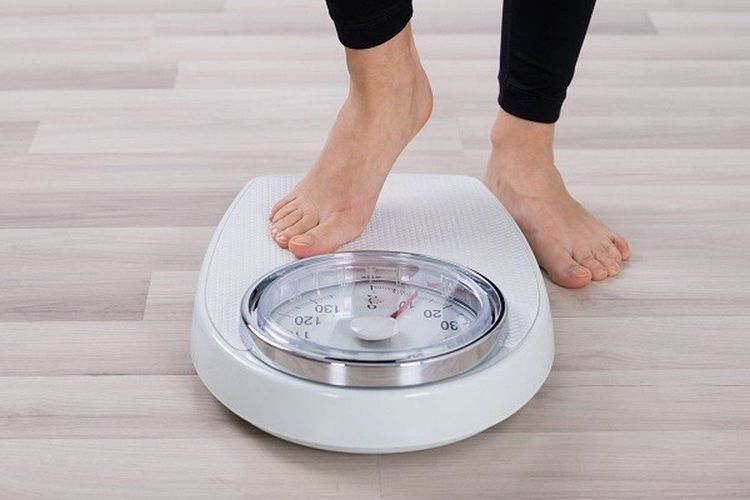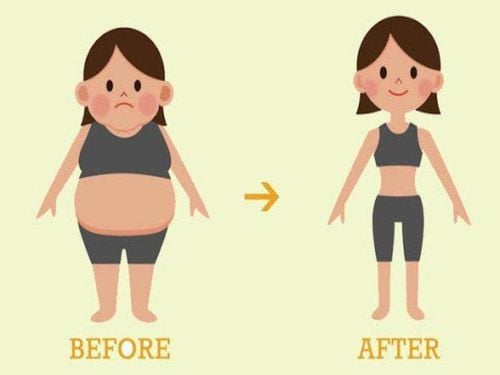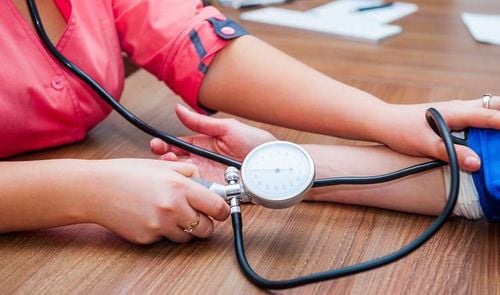This is an automatically translated article.
Sometimes the weight gain can be gradual and you're too busy to notice, or you don't want to think about it right now, or maybe you've been through so much that you just don't see the change. his weight. If you don't pay attention to your body, that's when your weight can easily add up without you realizing it. Therefore, to control your body, we have compiled 10 signs of weight loss you need to remember to monitor yourself in the article below.1. How long does it take to notice weight loss?
When you try to lose weight effectively in one way or another, it will take some time before you can notice some of the following signs of changes in your body:1.1. Body Size Begins to Change Your initial body size will affect how long you may notice results.
For example, if your initial weight falls into the overweight or obese range on your body mass index (BMI), your weight is unlikely to change rapidly.
When your initial body size is small and your BMI is low, your weight may decrease more slowly.
When your initial body size is larger, you can lose more weight at a faster rate, especially in the early days of the program.
1.2. Carbohydrate intake Limiting carbohydrates can lead to rapid dehydration. Your body needs water to store carbohydrates. When you drastically reduce the amount of carbohydrate you consume, you also lose the amount of water needed to store it.
For some people, water loss can make a difference between clothing sizes. But losing weight from dehydration is different from losing fat. While cutting carbs can be a smart approach to weight loss, it needs to be part of a comprehensive healthy eating program for sustainable weight loss
1.3. Weight Amount Research has often shown that weighing yourself regularly can be related to weight loss. It can be helpful to weigh yourself weekly, which measures your weight loss progress each week rather than each week. everyday.

Nghiên cứu thường chỉ ra rằng việc cân thường xuyên có thể liên quan đến việc giảm cân
Next, you may notice changes in the size of your clothes. Your actual size won't change immediately, but you'll notice that your clothes start to fit better. Ultimately, your total weight loss can lead to a reduction in your clothing size.
With some people, will notice an immediate change in the size of thighs, belly or face. That could be due to genetic or genetic factors. These changes can happen before or after you notice changes in the way your clothes fit. You should also keep in mind that increased muscle mass can lead to immediate weight gain.
1.5. Change in clothing size If you are a petite woman with a height of 1.52 meters, losing 4.5 kg of weight can mean a 10% reduction in your body weight. With that amount of weight you can reduce up to 2 clothing sizes. But if you're a very tall, athletic woman, losing 4.5 pounds should be trivial and may not change the size of your clothes.
Moreover, we often do not lose weight evenly throughout the body. The size of your clothes will depend on the measurements of each body part such as:
Change pant size: You need to reduce your waist and hip size by about 2.5 - 3.8 cm. Change your bust size: You need to reduce your bust and waist measurements by about 2.5cm in size 36 and about 3.8cm in shirt size 38 Change your outfit size: You need to reduce your measurements your waist, bust and hip circumference down by about 2.5cm each depending on the style and fit you prefer. 1.6. Time to lose weight A reduced size of clothes and a slimmer body are not the main benefits of weight loss, but will be a change you may notice in the end. Here is a sample timeline of when you might see these changes if you follow a healthy reduced-calorie eating plan and moderate exercise program — although this is not typical for everybody.
Week 1: Most people start to see some change in size (usually up to 5kg) this week. You will probably feel better, but won't see major changes in your body. Week Two: During the second week, you may start to notice changes in your body. Exercise will start to feel easier and your clothes will start to feel looser. Week Three: This is usually when you start to feel motivated in your weight loss journey. If you've been consistent in your weight loss plan, your body will respond well and you'll start to feel like the program has been a success. Week Four: By this time, you've probably lost enough weight (safely) to wear another size of clothing. After week four: Your new eating plan begins to look like a normal routine. Depending on how much weight you have to lose, you can start going back to an adjusted eating plan to maintain your weight.

Khi bạn nỗ lực giảm cân có hiệu quả bằng cách này hay cách khác, cũng sẽ phải mất một thời gian sau bạn mới có thể nhận thấy một vài dấu hiệu thay đổi của cơ thể
2. 10 signs of weight loss you need to remember to self-monitor
2.1. When you're no longer hungry If you're losing weight because you've changed your diet to include more protein, less carbs, and fat, you may notice that you feel full faster.That's because the amino acids in dietary protein send satisfaction signals to your brain - and that signal isn't sent by eating the same amount of calories in fat or carbs.
2.2. Your sense of well-being is improved. In a 2013 study, people trying to lose weight reported feeling more energetic, in control, less depressed, and less anxious than they did before losing weight.
If you're still not feeling these mental benefits, don't give up: Study participants did not report these improvements after 6 months. Major psychological changes were evident in the 12-month interviews.
If you lose weight unintentionally, such as after an injury, illness or a major life event. You probably won't experience such uplifting feelings.
2.3. Change in clothes You can wear the clothes of your dreams or you can simply put on old clothes that have been kept in the closet because they no longer fit.
In a 2017 StudyTrusted Source , about 77% of women and 36% of men said they were motivated to lose weight to improve the way clothing fits.

Một nghiên cứu cho thấy có tới 77% phụ nữ có động lực giảm cân để cải thiện cách mặc quần áo
A 2019 study found that young women built more muscle in their legs when they performed light-weight repetitions of leg curls and presses. If you want to continue building muscle while losing weight, experts recommend protein and do the right exercises.
2.5. Your Body Measurements Change A shrinking waistline is good news for your overall health. Researchers followed 430 people in a 2-year weight management program and found that reducing waist circumference was associated with improved outcomes for blood pressure, blood sugar, and cholesterol. A smaller waist means better heart health
2.6. Improved chronic pain Weight loss can help relieve pain, especially in weight-bearing areas such as the lower legs and lower back.
In a 2017 study, people who lost at least 10% of their body weight noticed the greatest improvement in chronic pain around weight-bearing areas.
In another study, losing 20% of body weight significantly improved knee pain and inflammation in people with reactive arthritis.
2.7. You go to the bathroom more. Changes in your diet affect bowel movement patterns.
Eliminating meat and adding more leafy greens and vegetables to your diet can improve constipation, while adding more animal protein to your diet (like many paleo diets). and keto) may make some people more likely to become constipated.
If you are concerned about differences in your bowel movements or if they are affecting your performance, then you should speak to a dietitian or healthcare provider to adjust your plan. plan to improve your gut health.
2.8. Your blood pressure is dropping Being overweight can negatively affect your blood pressure, making you more likely to have brain strokes and heart attacks. One way to lower blood pressure is to lose weight with a healthy diet and get more exercise. If you're losing weight, you're putting less strain on your heart and starting to normalize blood pressure.

Một cách để giảm huyết áp là giảm cân bằng chế độ ăn uống lành mạnh và vận động nhiều hơn
In fact, snoring and sleep apnea can even cause weight gain. For that reason, weight loss is often one of the targeted therapies for snorers and people with sleep disorders.
2.10. Improves Your Mood Changing healthy eating habits can lead to a better mood and more energy.
In a 2016 study, researchers found that a high-glycemic diet consisting of cookies, potatoes, crackers, cakes, and bagels, tended to cause spikes in blood sugar. blood sugar fluctuations, leading to 38% more symptoms of depression and 26% more fatigue compared with a low glycemic diet.
3. Signs of weight loss too fast you need to remember
Seeing a large weight change in a short time can be hugely motivating, but losing weight through fad diets or unsustainable practices can cause some nasty side effects. for health , such as:Hair loss Fatigue Slow metabolism Muscle cramps Gallstones Weak immune system It's better to lose weight safely you should talk to a nutritionist to get these the best advice for you.
Hope the above information has given you 10 signs of weight loss you need to remember to self-monitor. Wish you always have a scientific diet and improve your work productivity and improve your life.
Please dial HOTLINE for more information or register for an appointment HERE. Download MyVinmec app to make appointments faster and to manage your bookings easily.
Reference sources: verywellfit.com, healthline.com












